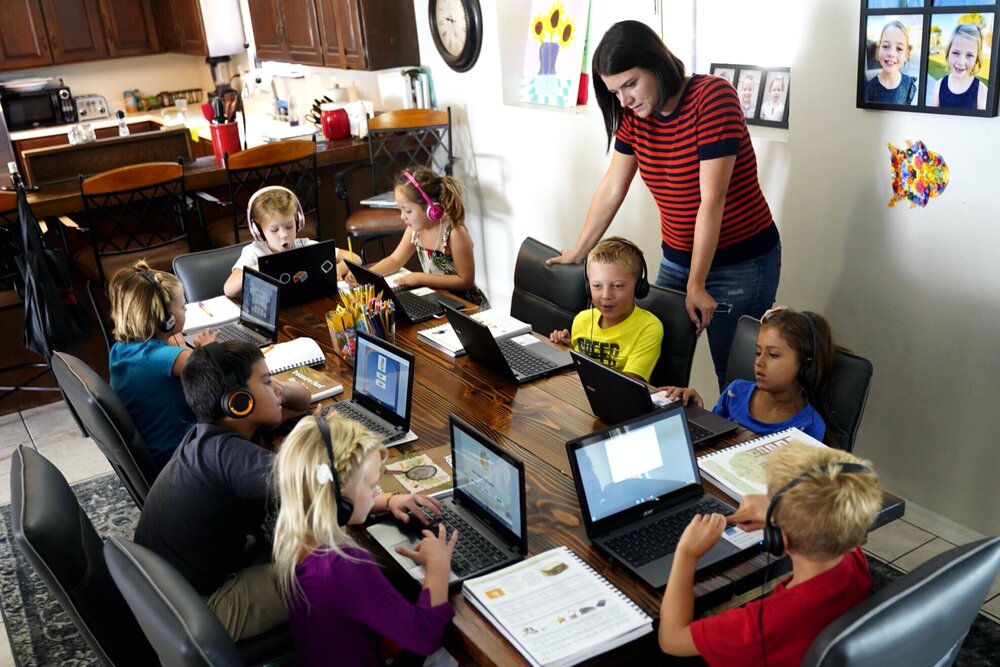As families and school districts work to ensure the success of all children after disruptions to traditional learning during the COVID-19 pandemic, the New Hampshire Department of Education has partnered with an EdTech company to provide students with access to learning pods starting this fall.
According to officials at NH DOE, throughout the pandemic and across the country, learning pods have served thousands of students in small-group, multi-age, and trauma-sensitive learning environments. These groups of five to 10 each are expected to be particularly helpful for children who have experienced learning loss or who thrive in an environment with individualized attention.
Commissioner of Education Frank Edelblut said on Wednesday that pods “create an environment where every child can be successful and find their place.”
The department will offer grants to school districts to support the creation of learning pods for students. Edelblut said the $6 million contract with Prenda will pay for the district’s fees and schools can still receive their adequacy aid from the state.
Under the Recovering Bright Futures Program, instruction will be conducted 100 percent by Prenda, which uses certified learning guides to help children on their educational journey.

A Prenda microschool class. (Courtesy)
Edelblut said he has reached out to superintendents to let them know about this unique educational opportunity.
“On a number of superintendent calls, I introduced the concept of learning pods to them,” Edelblut said.
Prenda, which is a remote company, was one of the organizations featured on Tuesday during EdTech Week. During a virtual masterclass on podding and technology, Treece Bowman spoke about her mission to serve marginalized communities as the head of Prenda’s equitable alliances division.
Bowman said Prenda serves 4,000 students in hundreds of learning pods in the United States and internationally.
“We have some microschools in Kenya, and it’s really cool to see how different each of these microschools are. I actually have a microschool in my own home that’s actually going on right now,” Bowman said.
Bowman explained students know what their goals are and can work at their own pace with the goal of a “future you” in mind.
“We always teach the kids, learning isn’t always going to be a comfortable thing, but we’re going to choose it anyway because that’s how you learn and grow,” Bowman said.
Kelly Smith, founder, and CEO of Prenda, said on Wednesday the partnership with NH DOE is the first time the company will have extended its model to an entire state.
Smith, who has a master’s degree in nuclear physics from MIT, said he developed the concept in 2013 when he was teaching a coding class at a local library. He realized standing in front of a whiteboard was a sure way to have the kids he was working with lose interest in the topic, even though they were there voluntarily.
“I thought, ‘What if we did this in a way that allowed them to be in the driver’s seat?’” Smith said.
Smith said a one size fits all model doesn’t always work, so Prenda can be helpful to all types of learners. He is looking forward to finding families in New Hampshire which can benefit from learning pods moving into the 2021-22 academic year.
Learning pods will be made available to students in kindergarten through eighth grade. Children will be grouped by K-2nd, 3-5th, and 6-8th grades.
Students will learn in their normal school building if the district has space to accommodate them. Learning pods may also gather at Boys and Girls Clubs, libraries, or a childcare facility.
Learning will be aligned with New Hampshire Academic Standards and students will be required to participate in statewide assessments, according to a fact sheet from the NH DOE.
Parents can enroll their children using the website www.prendaschool.com/new-hampshire.
Anyone with questions can contact Katie Murphy at NH DOE by emailing Susan.K.Murphy@doe.nh.gov.




